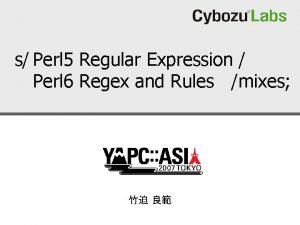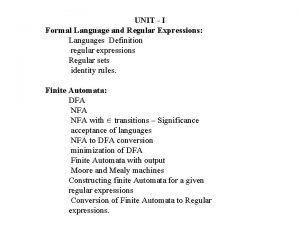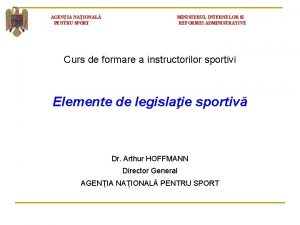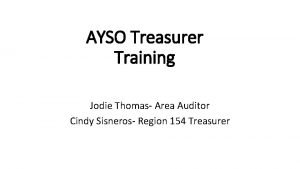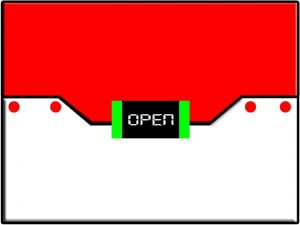CSE 154 LECTURE 21 COOKIES Regular expressions in


![PHP form validation w/ regexes $state = $_POST["state"]; if (!preg_match("/^[A-Z]{2}$/", $state)) { print "Error, PHP form validation w/ regexes $state = $_POST["state"]; if (!preg_match("/^[A-Z]{2}$/", $state)) { print "Error,](https://slidetodoc.com/presentation_image_h2/8cf7e83fe600402e72f936effba8c662/image-3.jpg)


![Using header to redirect between pages header("Location: url"); $city = $_POST["city"]; $state = $_POST["state"]; Using header to redirect between pages header("Location: url"); $city = $_POST["city"]; $state = $_POST["state"];](https://slidetodoc.com/presentation_image_h2/8cf7e83fe600402e72f936effba8c662/image-6.jpg)











![Retrieving information from a cookie $variable = $_COOKIE["name"]; # retrieve value of the cookie Retrieving information from a cookie $variable = $_COOKIE["name"]; # retrieve value of the cookie](https://slidetodoc.com/presentation_image_h2/8cf7e83fe600402e72f936effba8c662/image-18.jpg)




- Slides: 22

CSE 154 LECTURE 21: COOKIES

Regular expressions in PHP (PDF) • regex syntax: strings that begin and end with /, such as "/[AEIOU]+/" function description preg_match(regex, string) returns TRUE if string matches regex preg_replace(regex, replacement, string) returns a new string with all substrings that match regex replaced by replacement preg_split(regex, string) returns an array of strings from given string broken apart using given regex as delimiter (like explode but more powerful)
![PHP form validation w regexes state POSTstate if pregmatchAZ2 state print Error PHP form validation w/ regexes $state = $_POST["state"]; if (!preg_match("/^[A-Z]{2}$/", $state)) { print "Error,](https://slidetodoc.com/presentation_image_h2/8cf7e83fe600402e72f936effba8c662/image-3.jpg)
PHP form validation w/ regexes $state = $_POST["state"]; if (!preg_match("/^[A-Z]{2}$/", $state)) { print "Error, invalid state submitted. "; } PHP • preg_match and regexes help you to validate parameters • sites often don't want to give a descriptive error message here (why? )

The die function die("error message text"); • PHP's die function prints a message and then completely stops code execution • it is sometimes useful to have your page "die" on invalid input • problem: poor user experience (a partial, invalid page is sent back) PHP

The header function header("HTTP header text"); header("Location: url"); # in general # for browser redirection PHP • PHP's header function can be used for several common HTTP messages • sending back HTTP error codes (404 not found, 403 forbidden, etc. ) • redirecting from one page to another • indicating content types, languages, caching policies, server info, . . . • you can use a Location header to tell the browser to redirect itself to another page • useful to redirect if the user makes a validation error • must appear before any other HTML output generated by the script
![Using header to redirect between pages headerLocation url city POSTcity state POSTstate Using header to redirect between pages header("Location: url"); $city = $_POST["city"]; $state = $_POST["state"];](https://slidetodoc.com/presentation_image_h2/8cf7e83fe600402e72f936effba8c662/image-6.jpg)
Using header to redirect between pages header("Location: url"); $city = $_POST["city"]; $state = $_POST["state"]; $zip = $_POST["zip"]; if (!$city || strlen($state) != 2 || strlen($zip) != 5) { header("Location: start-page. php"); # invalid input; redirect } PHP • one problem: User is redirected back to original form without any clear error message or understanding of why the redirect occurred.

Including files: include("filename"); PHP include("header. html"); include("shared-code. php"); PHP • • inserts the entire contents of the given file into the PHP script's output page encourages modularity useful for defining reused functions needed by multiple pages related: include_once, require_once

Including a common HTML file <!DOCTYPE html> <!-- this is top. html --> <html><head><title>This is some common code</title>. . . include("top. html"); HTML # this PHP file re-uses top. html's HTML content • Including a. html file injects that HTML output into your PHP page at that point • useful if you have shared regions of pure HTML tags that don't contain any PHP content

Including a common PHP file <? php # this is common. php function useful($x) { return $x * $x; } function top() { ? > <!DOCTYPE html> <html><head><title>This is some common code</title>. . . <? php } include("common. php"); $y = useful(42); top(); . . . PHP # this PHP file re-uses common. php's PHP code # call a shared function # produce HTML output • including a. php file injects that PHP code into your PHP file at that point • if the included PHP file contains functions, you can call them

Stateful client/server interaction Sites like amazon. com seem to "know who I am. " How do they do this? How does a client uniquely identify itself to a server, and how does the server provide specific content to each client? • HTTP is a stateless protocol; it simply allows a browser to request a single document from a web server • today we'll learn about pieces of data called cookies used to work around this problem, which are used as the basis of higher-level sessions between clients and servers

What is a cookie? • cookie: a small amount of information sent by a server to a browser, and then sent back by the browser on future page requests • cookies have many uses: • authentication • user tracking • maintaining user preferences, shopping carts, etc. • a cookie's data consists of a single name/value pair, sent in the header of the client's HTTP GET or POST request

How cookies are sent • when the browser requests a page, the server may send back a cookie(s) with it • if your server has previously sent any cookies to the browser, the browser will send them back on subsequent requests • alternate model: clientside Java. Script code can set/get cookies

Myths about cookies • Myths: • Cookies are like worms/viruses and can erase data from the user's hard disk. • Cookies are a form of spyware and can steal your personal information. • Cookies generate popups and spam. • Cookies are only used for advertising. • Facts: • Cookies are only data, not program code. • Cookies cannot erase or read information from the user's computer. • Cookies are usually anonymous (do not contain personal information). • Cookies CAN be used to track your viewing habits on a particular site.

A "tracking cookie" • an advertising company can put a cookie on your machine when you visit one site, and see it when you visit another site that also uses that advertising company • therefore they can tell that the same person (you) visited both sites • can be thwarted by telling your browser not to accept "third-party cookies"

Where are the cookies on my computer? • IE: Home. DirectoryCookies • e. g. C: Documents and SettingsjsmithCookies • each is stored as a. txt file similar to the site's domain name • Chrome: C: UsersusernameApp. DataLocalGoogleChromeUser DataDefault • Firefox: Home. Directory. mozillafirefox? ? ? . defaultcookies. txt • view cookies in Firefox preferences: Privacy, Show Cookies. . .

How long does a cookie exist? • session cookie : the default type; a temporary cookie that is stored only in the browser's memory • when the browser is closed, temporary cookies will be erased • can not be used for tracking long-term information • safer, because no programs other than the browser can access them • persistent cookie : one that is stored in a file on the browser's computer • can track long-term information • potentially less secure, because users (or programs they run) can open cookie files, see/change the cookie values, etc.

Setting a cookie in PHP setcookie("name", "value"); setcookie("username", “allllison"); setcookie("age", 19); PHP • setcookie causes your script to send a cookie to the user's browser • setcookie must be called before any output statements (HTML blocks, print, or echo) • you can set multiple cookies (20 -50) per user, each up to 3 -4 K bytes • by default, the cookie expires when browser is closed (a "session cookie")
![Retrieving information from a cookie variable COOKIEname retrieve value of the cookie Retrieving information from a cookie $variable = $_COOKIE["name"]; # retrieve value of the cookie](https://slidetodoc.com/presentation_image_h2/8cf7e83fe600402e72f936effba8c662/image-18.jpg)
Retrieving information from a cookie $variable = $_COOKIE["name"]; # retrieve value of the cookie if (isset($_COOKIE["username"])) { $username = $_COOKIE["username"]; print("Welcome back, $username. n"); } else { print("Never heard of you. n"); } print("All cookies received: n"); print_r($_COOKIE); • any cookies sent by client are stored in $_COOKIES associative array • use isset function to see whether a given cookie name exists PHP

Expiration / persistent cookies setcookie("name", "value", expiration); PHP $expire. Time = time() + 60*60*24*7; # 1 week from now setcookie("Coupon. Number", "389752", $expire. Time); setcookie("Coupon. Value", "100. 00", $expire. Time); PHP • to set a persistent cookie, pass a third parameter for when it should expire • indicated as an integer representing a number of seconds, often relative to current timestamp • if no expiration passed, cookie is a session cookie; expires when browser is closed • time function returns the current time in seconds • date function can convert a time in seconds to a readable date

Deleting a cookie setcookie("name", FALSE); PHP setcookie("Coupon. Number", FALSE); PHP • setting the cookie to FALSE erases it • you can also set the cookie but with an expiration that is before the present time: setcookie("count", 42, time() - 1); PHP • remember that the cookie will also be deleted automatically when it expires, or can be deleted manually by the user by clearing their browser cookies

Clearing cookies in your browser • Chrome: Wrench → History → Clear all browsing data. . . • Firefox: Firefox menu → Options → Privacy → Show Cookies. . . → Remove (All) Cookies

Common cookie bugs When you call setcookie, the cookie will be available in $_COOKIE on the next page load, but not the current one. If you need the value during the current page request, also store it in a variable: setcookie("name", "joe"); print $_COOKIE["name"]; # undefined PHP $name = "joe"; setcookie("name", $name); print $name; # joe PHP • setcookie must be called before your code prints any output or HTML content: <!DOCTYPE html><html> <? php setcookie("name", "joe"); # should precede HTML content!
 Cse 154
Cse 154 Cse 154
Cse 154 01:640:244 lecture notes - lecture 15: plat, idah, farad
01:640:244 lecture notes - lecture 15: plat, idah, farad Perl6 失敗
Perl6 失敗 Formal language
Formal language Inductive definition of regular expressions
Inductive definition of regular expressions Primitive regular expressions
Primitive regular expressions Xkcd regular expressions
Xkcd regular expressions Regular expressions wikipedia
Regular expressions wikipedia Construction of epsilon nfa from regular expression
Construction of epsilon nfa from regular expression Site:slidetodoc.com
Site:slidetodoc.com Regular expressions
Regular expressions Regular grammars generate regular languages
Regular grammars generate regular languages Inst-154
Inst-154 Al baqarah 154-157
Al baqarah 154-157 Kerucut dengan diameter alas 4 cm dan tinggi 6 cm
Kerucut dengan diameter alas 4 cm dan tinggi 6 cm Cr part 154
Cr part 154 Inst-154
Inst-154 Ordinul 154 din 2004
Ordinul 154 din 2004 Efrona
Efrona Duties of treasurer
Duties of treasurer Homework 154
Homework 154 Dodo akan memberi kado ulang tahun buat desi
Dodo akan memberi kado ulang tahun buat desi



